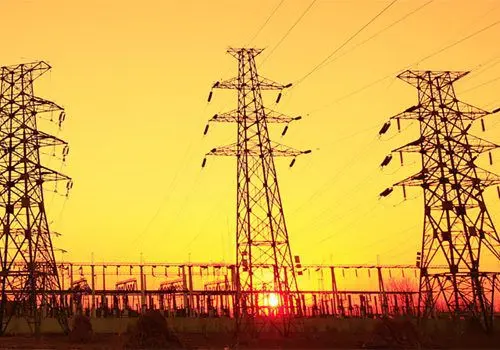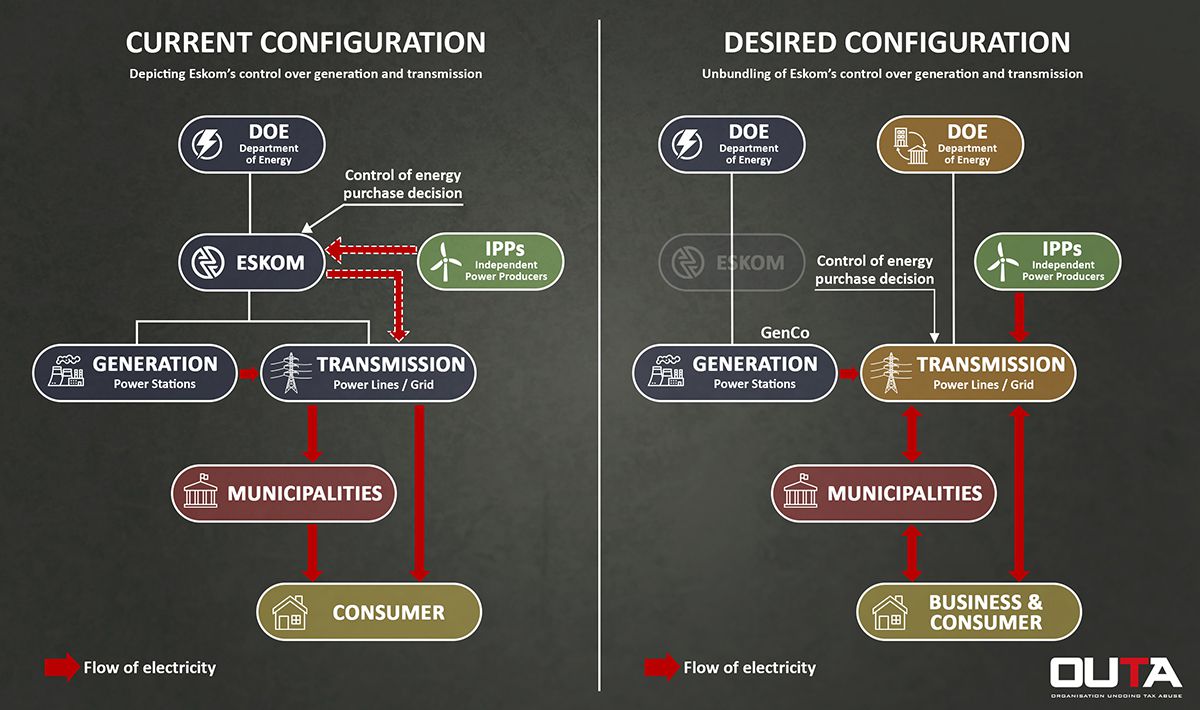Unbundling Eskom
WHY OUTA WANTS TO UNBUNDLE ESKOM

WHY UNBUNDLE ESKOM?
OUTA believes that a separation of control over the two arms of electricity generation and transmission will break Eskom’s stranglehold over the grid (transmission), thereby ensuring that open competition for energy generation at the lowest cost of production will reach the consumer, assuming political meddling is minimized which in itself may be a separate challenge. In short, this challenge is to reduce the costs of energy to the consumer.
WHAT ARE THE BENEFITS OF UNBUNDLING ESKOM?
OUTA’s complaint to the Competition Commission (CC) 20 February 2017, is based on Eskom’s abuse of its dominant position in the electricity market and its exclusionary acts.
OUTA’s complaint to the Competition Commission (CC) 20 February 2017, is based on Eskom’s abuse of its dominant position in the electricity market and its exclusionary acts. In doing so, OUTA hopes the CC will rule in agreement with OUTA’s complaint, in which case, its recommendations could result in punitive fines for Eskom and its management, as well as pave the way for government action to separate the management and control of the Grid (Transmission) from the Generating activities.
Over the past number of years, Eskom has been implicated in numerous scandals and concerns related to inefficiencies and high costs of electricity generation. This has manifest itself by Eskom’s exorbitant electricity tariff hikes over past ten years (by over 500%).
Furthermore, Eskom’s unwarranted, corrupt and poor leadership conduct has been highlighted in the Public Protector’s “State of Capture Report” and the “Dentons Report”.
By splitting the management of these two elements of electricity management in South Africa, you move the decision making (and therefor the control) of the energy purchase decisions to the “GridCo” (Transmission) entity. Their conduct of electricity purchasing, will be driven by the best interests of the consumer, as opposed to the interests of the electricity generator. In doing so, the consumer will require the cheapest electricity on a reliable basis, across the country.
Some of the envisaged benefits to the consumer in the event of the separation of control of generation and transmission are:-
- An independent grid operator will decide what power South Africa requires, at what prices and in what amounts;
- Price increases will be contained as proper competition is introduced;
- Blackouts due to poor management or corruption within the SOE will be avoided;
- Corruption within Eskom will no longer be passed onto the electricity consumer;
- Municipalities will be at liberty to buy directly from Independent Power Producers or to construct their own electricity generation plants;
- All competitive power generation options will be allowed onto the grid;
- Maintenance and expansion of the grid will be rationalized and driven by economic reasons;
- Greater flexibility should arise for consumers to enter agreements with municipalities;
- It will enable municipalities to purchase excess electricity from household solar energy when available;
- Eskom will no longer be able to hold the South African public to ransom;
- The lower cost of electricity in South Africa will stimulate job creation and economic growth, closer to the National Developments Plan (NDP) of 5% per annum or greater;
- The lower cost of electricity will restore South Africa’s competitive advantage and stimulate investment opportunities in the country;
- South Africa will move further away from the situation where an Eskom insolvency or technical failure will pull down the entire grid.
HOW OUTA INTENDS TO TACKLE THIS MATTER
The unbundling of Eskom is a multi-faceted challenge and will require the issue to be addressed through a number initiatives:-
- Complaint to the Competition Commission.
- Petitions from the public to support OUTA’s complaint.
- Presentations to oversight bodies:-
- NERSA
- Parliamentary Portfolio Committee
- Department of Energy
- Industry and Business Associations
- Unions
- Possible applications to the CC Tribunal / Courts for interim relief to stay further abuse of dominance and/or new energy build decisions.
- Empowering the public with knowledge, facts and their rights.
- Engage with the media and public at large on developments and strategic intent.
ELECTRICITY GENERATION AND POWER STRUCTURE
